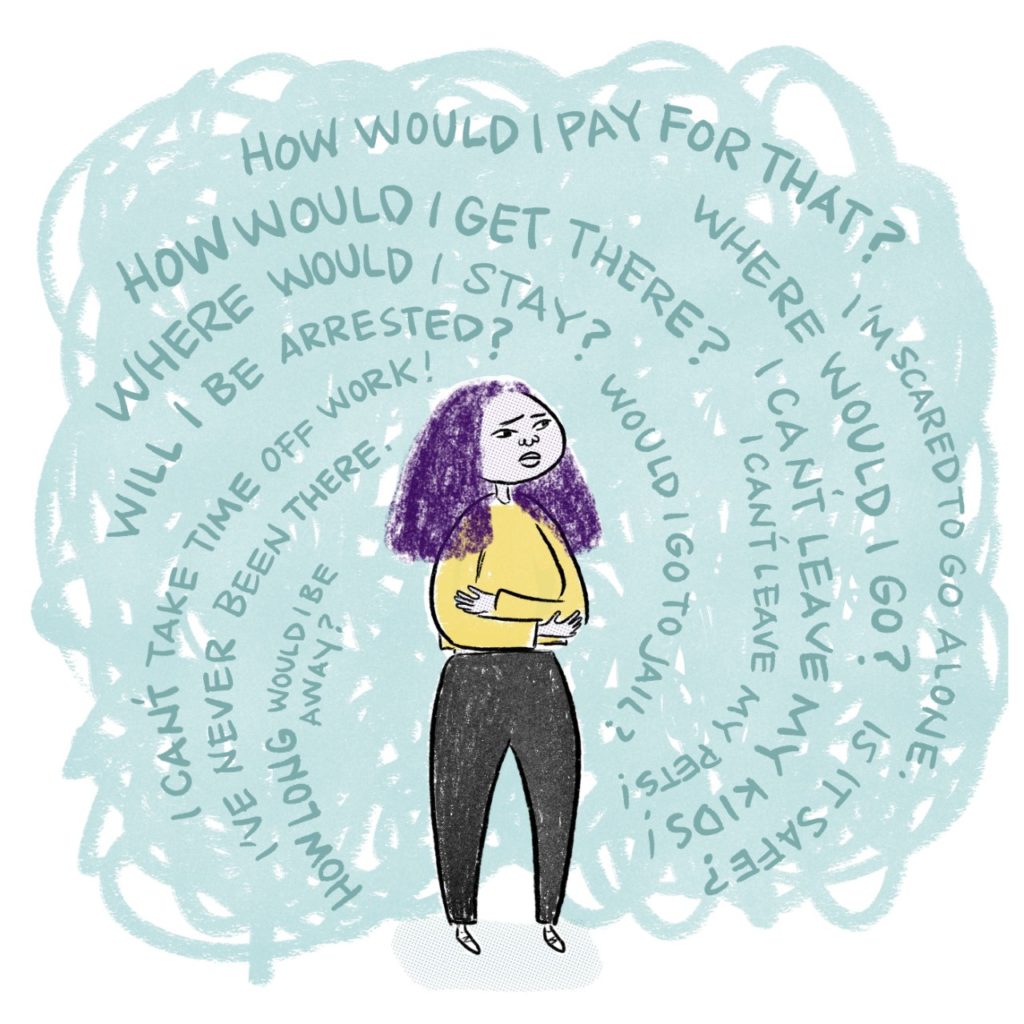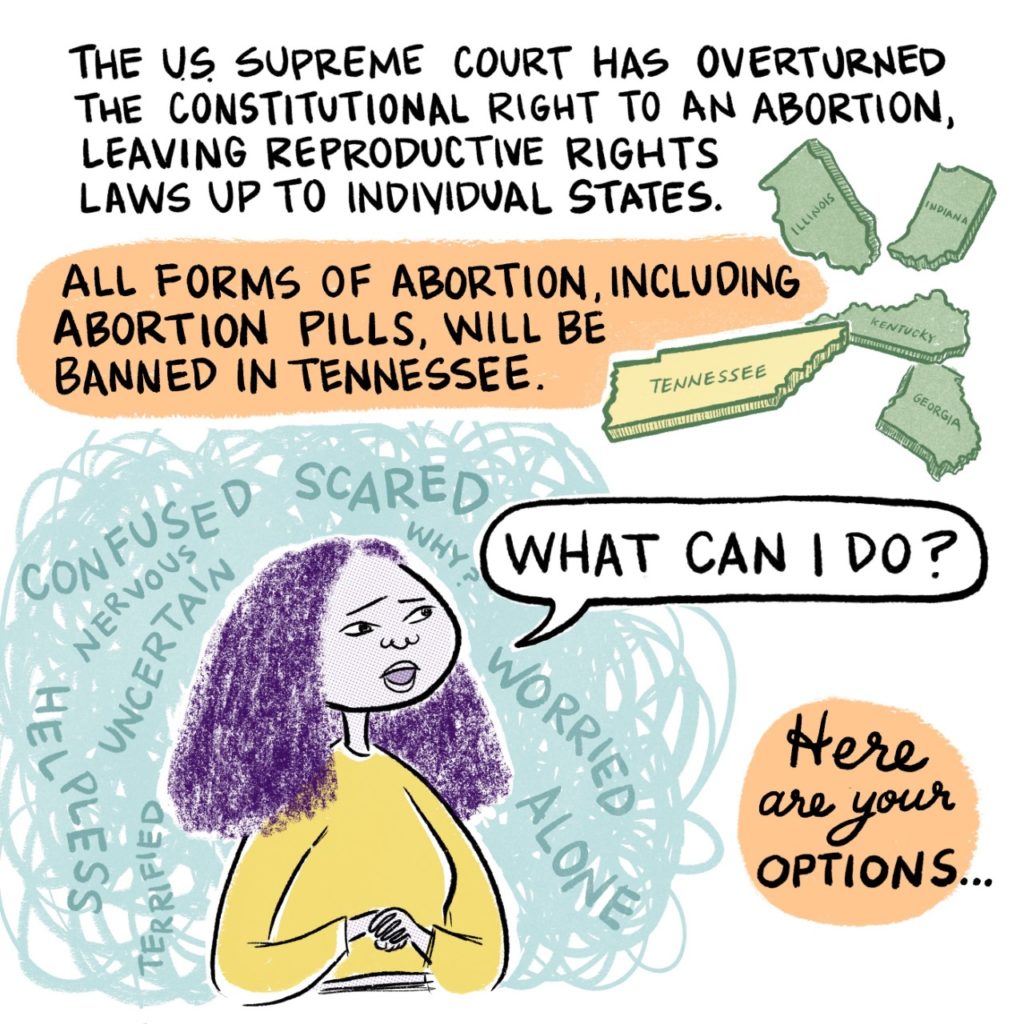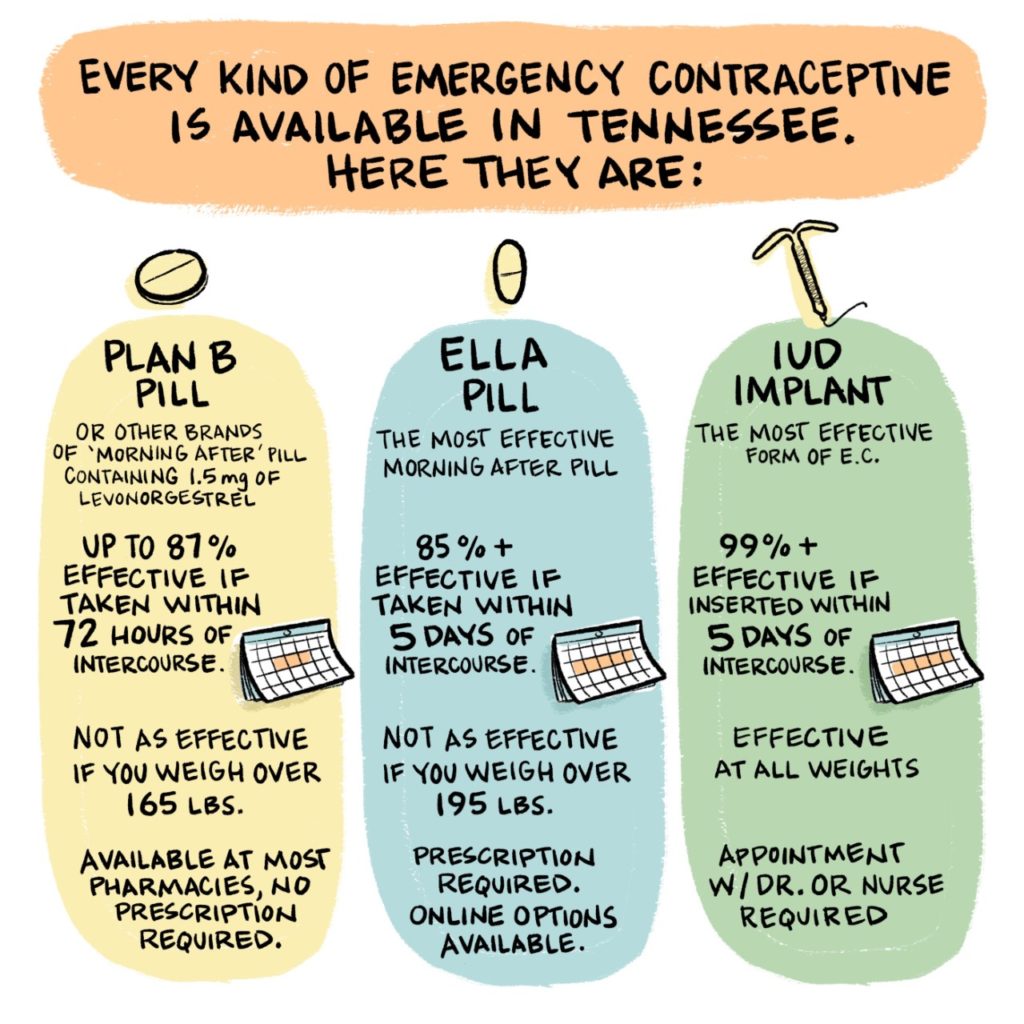
The Supreme Court’s decision in Dobbs v. Jackson Women’s Health has already dramatically changed the landscape for abortion rights in Tennessee.
On Tuesday, a federal court ruled that a 2020 law banning most abortions at or after 6 weeks gestational age can go into effect immediately. Later this summer, a law that extends that ban back to the moment of fertilization will go into effect.
But Tennesseans do have some options if they’re pregnant — or think they could become pregnant. Here’s an explanation of what’s changed in Tennessee and the options available.
Note: Because of the rapidly evolving legal situation in Tennessee and elsewhere following the Dobbs ruling, this information may be out of date. For the latest on abortion access, including in other states, visit abortionprovider.org.
First, what was the situation in Tennessee before the Dobbs ruling?
According to the Tennessee Department of Health, which has been collecting data for years on what it calls “induced termination of pregnancy,” there were about 9,700 abortions in the state in 2019, the most recent year for which it has data.
Before the Dobbs ruling, Tennessee allowed abortions up to 20 weeks into pregnancy, but most happened months before then. According to the state, 89% of abortions in 2019 were in the first trimester of pregnancy, or before 12 weeks. About one in five were before 7 weeks.
About half of all abortion patients in 2019 were Black, which experts link to limited access to health care and fewer birth control choices. Roughly 60% of patients were in their 20s, and another 29% were in their 30s. Nearly two-thirds had never had an abortion before, and about one in seven patients were married.
Until recently, there have been six abortion providers in Tennessee: One in Bristol, two in Memphis (one of which had two locations), one in Knoxville, one in Nashville and one in Mt. Juliet. A seventh provider was burned down New Year’s Eve 2021.
(Source: TN Department of Health, Induced Termination of Pregnancy Statistics, 2019)

Is emergency contraception, such as Plan B, going to be illegal in Tennessee?
No. All contraception, including emergency contraception, works by preventing pregnancy — not terminating it. Levonorgestrel, which is often sold as Plan B, primarily works by preventing the release of an egg from the ovary and will not work if a fertilized egg has been attached to the womb. Other drugs work similarly.
But there are limits to Plan B’s effectiveness. It has to be taken within 72 hours of intercourse, and it works best if taken within 24 hours. Effectiveness also declines in people who weigh more than 155 pounds and may not work at all in people over 195 pounds.
Plan B is not the same drug as mifepristone, also known as Mifeprex or RU-486, which would be illegal to dispense in Tennessee for purposes of causing an abortion. The drug is also used during miscarriages, and physicians are worried that Tennessee’s ban on abortion medications will affect its availability.
Some intrauterine devices can also be used an emergency contraception if implanted within five days.
(Sources: WebMD, Planned Parenthood, Food and Drug Administration)


I keep hearing about abortion being totally banned in Tennessee and about abortion being banned after 6 weeks of pregnancy. Which is it?
In a sense, both.
In 2019, the state legislature passed a “trigger law” that totally bans abortion, except “to prevent the death of the pregnant woman or to prevent serious risk of substantial and irreversible impairment of a major bodily function.” It will go into effect 30 days after the U.S. Supreme Court issues its judgment in the Dobbs case. But this hasn’t happened yet, because the Dobbs judgment is separate procedurally from the Dobbs opinion released on June 24. The Tennessee attorney general expects the Dobbs judgment to come out by mid-July, which would mean abortion would become illegal after fertilization in Tennessee sometime in mid-August.
Apart from that law, the legislature passed a measure in 2020 that bans abortions 6 weeks past conception if cardiac activity can be detected and up to 8 weeks if no cardiac activity can be found. It had been blocked in court until the Dobbs ruling, but 6th U.S. Circuit Court of Appeals says it can now go into effect. It’s expected to be the law in Tennessee until the total ban begins.
(Sources: Tennessee General Assembly, Tennessee Attorney General’s Office)


What if I’m pregnant now? Where can I get an abortion?
CHOICES in Memphis is still performing abortions at the moment, but once the total ban goes into effect, the only providers would be out of state. Abortion rights groups have been pointing to Illinois or Virginia, where there are no waiting periods. But here is the situation in Tennessee’s nearest neighbors:
Georgia: A law passed in 2019 bans abortion after cardiac activity can be detected, roughly 6 weeks, but it has been enjoined by a court. Otherwise, abortion allowed up to 22 weeks with a mandatory 24-hour waiting period.
Alabama: A total ban on abortion passed in 2019.
Mississippi: A ban at 6 weeks passed in 2019. A trigger law and pre-Roe ban on abortion could prohibit all abortion.
Louisiana: A ban on abortion at 6 weeks passed in 2019. A trigger law would prohibit abortion in almost all cases.
Arkansas: A total ban on abortion passed in 2019.
Missouri: The state has a ban on abortion after 8 weeks, and a trigger law passed in 2019 that could prohibit all abortion.
Illinois: Abortion rights legislation was approved in 2019, and the Illinois Supreme Court has recognized a right to abortion under the state constitution. No waiting period is required.
Kentucky: A trigger law was passed in 2019 intended to make abortion illegal in all cases. It is now in effect.
Indiana: Abortion has been allowed up to 22 weeks, but with a 18-hour waiting period.
West Virginia: Abortion has been allowed up to 22 weeks, but with a 24-hour waiting period.
Virginia: Bans abortion beyond “viability,” but many other restrictions on abortion repealed in 2020. No waiting period required.
North Carolina: Abortion was prohibited under a pre-Roe ban, but the state’s governor supports abortion rights and says he’ll oppose any effort to reinstate it. A 72-hour waiting period is required.
South Carolina: The state approved a ban after 6 weeks in 2021; otherwise abortion would be allowed up to 20 weeks. A 24-hour waiting period is required.
(Sources: Center for Reproductive Rights, Guttmacher Institute, WPLN research)

